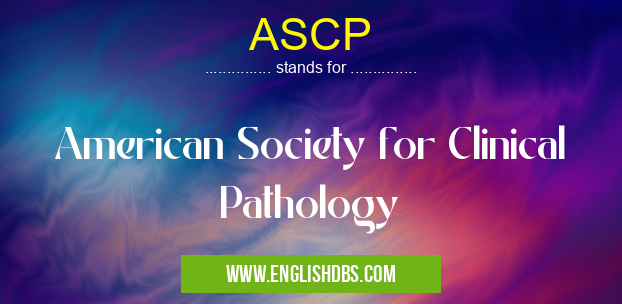What does ASCP mean in LABORATORY
The American Society for Clinical Pathology (ASCP) is a not-for-profit professional society committed to providing excellence in education and certification of pathology and laboratory professionals. Established in 1922, the ASCP is one of the oldest medical societies in the United States, with more than 95,000 members worldwide. The organization is composed of allied health professionals, including certified histotechnicians/technologists, cytotechnologists, molecular biology scientists, hemepathologists, phlebotomists, medical laboratory scientists (MLS), and directors/ administrators of laboratories. ASCP advocates on behalf of its members at a national level while working to advance patient care through continuing education opportunities and innovative services.

ASCP meaning in Laboratory in Medical
ASCP mostly used in an acronym Laboratory in Category Medical that means American Society for Clinical Pathology
Shorthand: ASCP,
Full Form: American Society for Clinical Pathology
For more information of "American Society for Clinical Pathology", see the section below.
» Medical » Laboratory
Meaning
The American Society for Clinical Pathology (ASCP) is an international professional association dedicated to setting standards in clinical laboratory science through research and advocacy. The mission of this organization includes the promotion of quality healthcare delivered through laboratory testing and striving to provide education in many scientific disciplines that involve patient care. Through professional certifications offered by ASCP, pathologists and lab professionals can demonstrate their expertise across a wide range of topics including hematology/oncology, immunohematology, microbiology & parasitology, chemistry & urinalysis as well as management & operations of labs.
Role
The mission of ASCP is to provide excellence in education and certification for pathology and laboratory professionals worldwide; advocating for patients' access to quality care provided through effective use of clinical laboratory tests; serving as advocates for pathologists’ practice rights; leading efforts within healthcare regulatory policy making; supporting ongoing research opportunities; developing cutting-edge continuing education programs; and promoting best practices in pathology laboratories around the world. By offering rigorous exams that ensure accurate test results are generated by qualified personnel who understand their role within the lab environment, patients receive more accurate diagnoses which often lead to better outcomes. As clinicians rely increasingly on test results generated from labs run by untrained or undertrained personnel problems such as false positives or inappropriate treatment plans may occur which may have serious repercussions. It is therefore vital that credentialing organizations like ASCP continue their work in providing comprehensive certifications that ensure accuracy from both a technical standpoint as well as an administrative one.
Essential Questions and Answers on American Society for Clinical Pathology in "MEDICAL»LABORATORY"
What is the ASCP?
The American Society for Clinical Pathology (ASCP) is a professional membership organization that promotes and certifies excellence in the practice of pathology and laboratory medicine. Founded in 1922, ASCP supports its members’ individual and collective success through education, advocacy, certification, and resources.
What are the roles of an ASCP member?
Members of ASCP can serve as advocates for patient safety by promoting increased quality standards in their professional fields; they can also be leaders in the industry by maintaining certifications, growing professionally through education opportunities, contributing to research initiatives, and influencing policy related to healthcare legislation.
What is board certification with ASCP?
Board certification from ASCP is a voluntary process which validates an individual's expertise at a specialty level within the field of laboratory medicine. By completing the necessary requirements to obtain board certification with ASCP (e.g., experience, exams), medical technologists gain recognition for their specialized knowledge and skills.
What types of certification does ASCP offer?
ASCP offers several types of certification including Medical Laboratory Scientist (MLS), Histotechnologist (HTL), Histotechnician (HT), Cytogenetic Technologist (CT), Hematology Technologist (H Prac.), Blood Bank Technologist (BB Tech.), Transfusion Medicine Technologist (Tm Tech.), Molecular Biologist (MB), Microbiology Technologist (M Prac.) and Quality Assurance Professional Certification programs. Additionally, all candidates must hold a current valid state license or equivalent certification issued by another recognized accrediting agency before being eligible for any program offered by ASSP.
Is there an application fee for receiving board certification with ASCP?
Yes, there is an application fee associated with each board-certification program offered by The American Society for Clinical Pathology. Please refer to their website for specific rate information related to your desired exam or contact customer service directly at 800-267-2727 or [email protected].
How do I maintain my certified status with ASCP?
To maintain certified status with The American Society for Clinical Pathology one must complete continuing education credits every three years using courses relevant to their discipline in order to stay up to date on industry advancements within their profession and remain compliant as outlined in their specific program / course requirements.
How does re-certification work if I am already certified with AESCP?
Re-certification requires individuals who are already certified by The American Society for Clinical Pathology to continue meeting continuing education requirements while also submitting evidence that demonstrates they are performing at expected levels within the specified competencies required by them program(s). All re-certification materials must be submitted no later than sixty days prior to expiration date listed on your current certificate.
Final Words:
In conclusion, it is essential that certified practitioners have access to sound educational resources like those provided by ASCP if they are expected deliver optimal service in laboratories all around the world. Through certification examinations and other educational initiatives such as conferences or webinars on infectious diseases or specific analytical techniques among others , practitioners validate their knowledge base which ultimately leads to improved patient care everywhere. In order for clinical laboratories to operate efficiently there also must be adequate regulation so that administrative procedures are followed correctly and optimal results are obtained from each test performed ensuring accuracy at all times thus reducing errors resulting uncertain outcomes that could ultimately affect patient health negatively.
